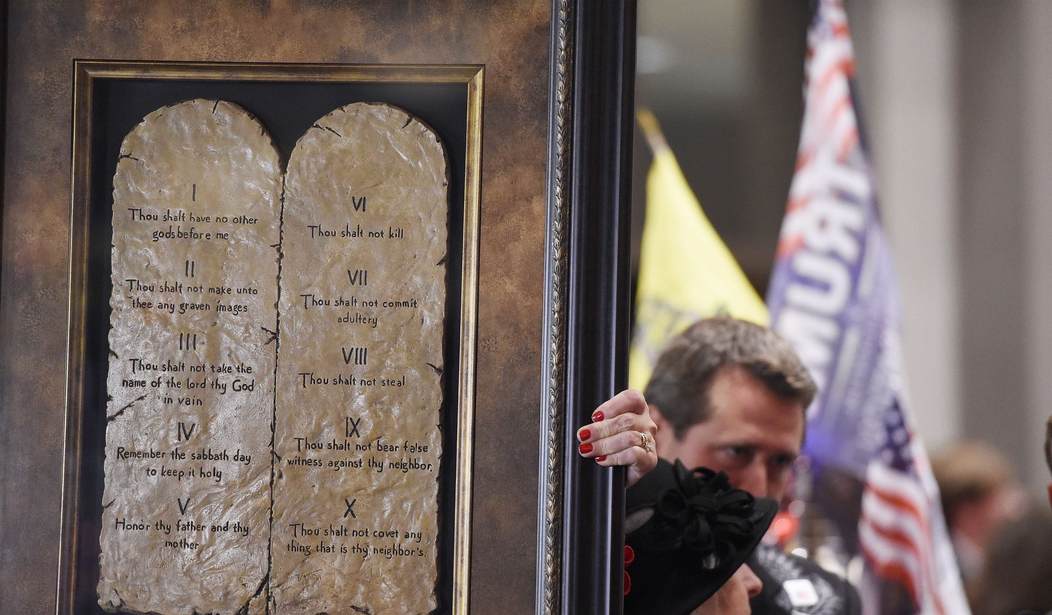In June of last year, HB 71 was signed into law by Louisiana Governor Jeff Landry. That bill required public schools to display the Ten Commandments in a historical context. This also included displaying documents like the Mayflower Compact, the Declaration of Independence, and the Northwest Ordinance.
The legislation argued that including the Ten Commandments "is part of our state and national history, culture, and tradition" and cited James Madison as recognizing their role in the founding of America, saying, "Recognizing the historical role of the Ten Commandments accords with8 our nation's history and faithfully reflects the understanding of the founders of our nation with respect to the necessity of civic morality to a functional self-government. History records that James Madison, the fourth President of the United States of America, stated that "(w)e have staked the whole future of our new nation . . . upon the capacity of each of ourselves to govern ourselves according to the moral principles of the Ten Commandments."
It also pointed to Van Orden v. Perry (2005), a case in which the Supreme Court said a public display of the Ten Commandments was Constitutional.
Civil liberties groups, including the ACLU, sued over the law, citing First Amendment and Establishment Clause violations, according to the Guardian:
US civil liberties groups have sued Louisiana for what they called its “blatantly unconstitutional” new law requiring all state-funded schools to display the Ten Commandments in classrooms.
The American Civil Liberties Union (ACLU) joined with its Louisiana affiliate and two other bodies – Americans United for Separation of Church and State and the Freedom from Religion Foundation – for the suit against the law, signed on Wednesday by the state’s rightwing Republican governor, Jeff Landry.
Recommended
"We’re suing Louisiana for requiring all public schools to display the Ten Commandments in every classroom," wrote the ACLU in an X post. "Public schools are not Sunday schools."
In a joint statement, those who sued Louisiana said, "The First Amendment promises that we all get to decide for ourselves what religious beliefs, if any, to hold and practice, without pressure from the government. Politicians have no business imposing their preferred religious doctrine on students and families in public schools."
NBC News ran an op-ed calling the law "the first step in a sinister vision for the country:"
In that sense, HB 71 raises serious questions about First Amendment rights and multicultural education concerns. Multicultural education assumes schools embrace all kinds of diversity, including religious diversity. A hidden curriculum question raised by HB 71 is whether, as a matter of civic morality, hanging the Ten Commandments in a classroom contradicts public educational institutions’ responsibility to embrace all forms of diversity. How will atheist, agnostic or Hindu students interpret a state-mandated display that says, “I am the Lord thy God. Thou shalt have no other gods before me?” It makes sense that some of these students will see any learning environment that posts a theological document in such a prominent position as actively seeking to convert them. They may interpret such an environment and the hidden civil morality curriculum of HB 71 as hostile.
In November 2024, a federal judge blocked the law, and the Fifth Circuit upheld that ruling in June of this year.
Today, the Fifth Circuit agreed to revisit the case en banc. Becket, a non-profit law firm, is defending the law and wrote about the upcoming en banc hearing on X.
The full Fifth Circuit federal appeals court agreed today to decide whether Louisiana can display a document important to American law and history—the Ten Commandments—in its public schools.
— BECKET (@becketfund) October 6, 2025
In their appeal, Becket noted the schools "have broad flexibility in designing the displays, no public funds are needed for their installation, and no students or teachers are required to engage with them in any way. They are just posters on a classroom wall."
Louisiana recently passed a law requiring public schools to display small posters including the Ten Commandments that acknowledge the Ten Commandments’ influence on American law and history. Schools have broad flexibility in designing the displays, no public funds are needed for…
— BECKET (@becketfund) October 6, 2025
The three-judge panel called the law "blatantly unconstitutional."
However, after the ACLU filed a lawsuit against the state, a federal judge temporarily put the law on hold. And then in a decision on appeal earlier this year, three Fifth Circuit judges left the lower court’s ruling in place. https://t.co/saOB0gd9Ao
— BECKET (@becketfund) October 6, 2025
Becket also argued that religious symbols and words are part of American society and history. In a post on X, they wrote, "Symbols with religious origins have been a natural part of American culture for centuries—appearing on our state flags, seals, currency, and national monuments. One need only look at a dollar bill bearing the words “In God We Trust” to know religion is a deeply-rooted part of the American experience. Louisiana is simply continuing that tradition by including one of the most enduring of these symbols in its public schools."
No date has been set for the hearing, but it is expected to take place early next year.
Editor’s Note: The Schumer Shutdown is here. Rather than put the American people first, Chuck Schumer and the radical Democrats forced a government shutdown for healthcare for illegals. They own this.
Help us continue to report the truth about the Schumer Shutdown. Use promo code POTUS47 to get 74% off your VIP membership.

























Join the conversation as a VIP Member